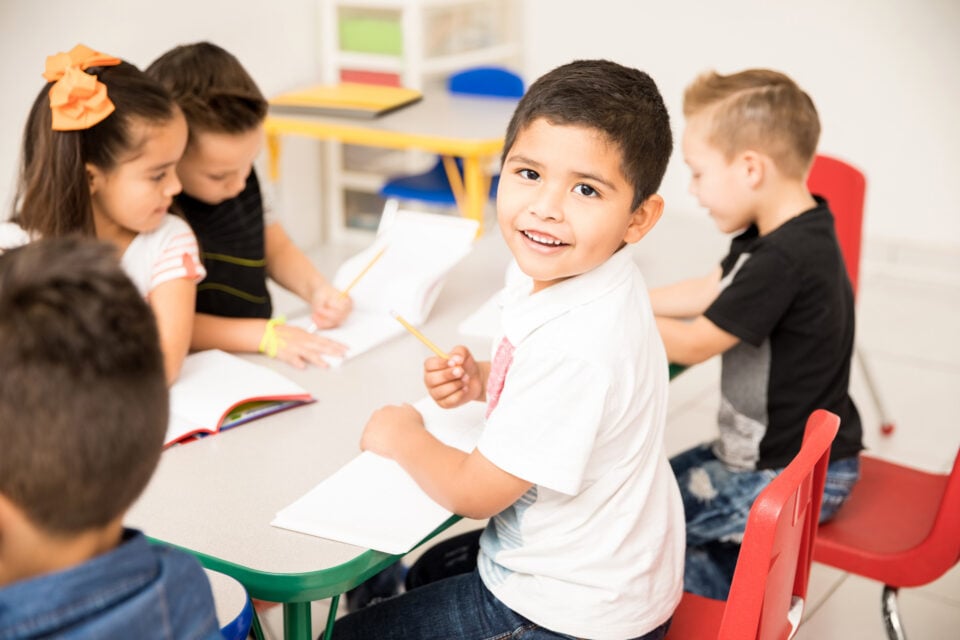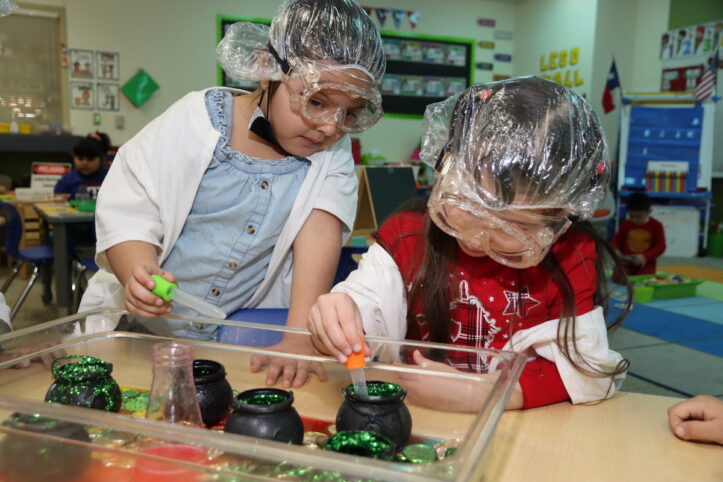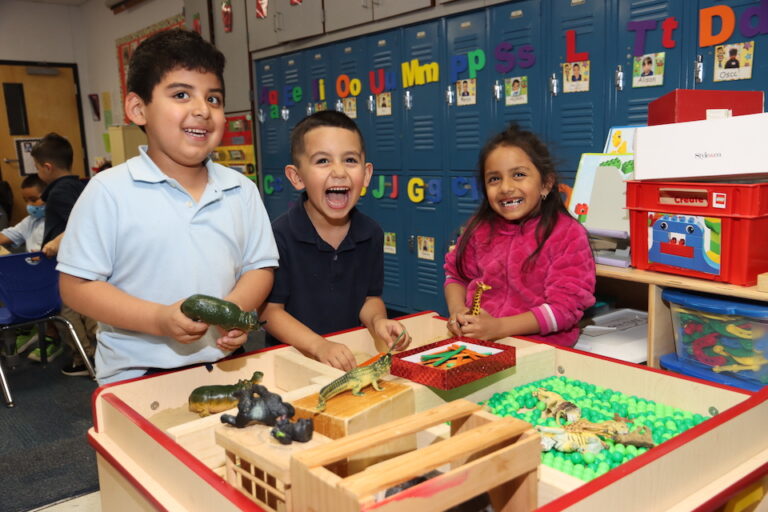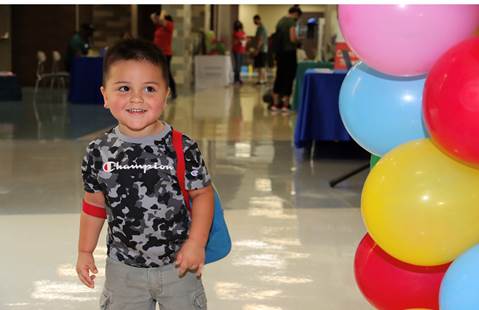
Pre-K launches students on their educational journey
Today was the very first day of school ever for bunches of 3- and 4-year-olds in the Arlington ISD.
It was probably a little hard for them – and their parents – to head off to pre-K for the first time. But they’re going to love it. And they’re going to get a jumpstart on their education that will not only prepare them for kindergarten but also their entire educational journey.
That’s because pre-K is so critically important.
It gets children ready to learn, teaches important social and emotional skills and fosters the development of verbal skills and self-control. Pre-K students get a head start on reading and are usually ahead of their peers who wait until kindergarten to start school.
“Research demonstrates that high-quality preschool education can substantially increase children’s chances of succeeding in school and in life,” said Dr. Jackeline Orsini, Arlington ISD’s director of early childhood learning. “It helps build a strong foundation for kindergarten and sets them up for greater success in many areas of life.”
Here are just a few of the reasons why pre-K is so important for every child.
1) Inspires Learning
Pre-K provides opportunities for children to learn in ways that interest them. Arlington ISD’s pre-K programs promote curiosity, creativity and exploration. Children are encouraged to make decisions, ask questions, think and solve through purposeful play.
 “We help pre-K students build a strong literacy foundation and excitement to continue learning,” Orsini said. “Our early childhood teachers make learning fun by integrating a variety of games and activities, music, physical movement, arts, read-aloud stories, technology and dramatic play.”
“We help pre-K students build a strong literacy foundation and excitement to continue learning,” Orsini said. “Our early childhood teachers make learning fun by integrating a variety of games and activities, music, physical movement, arts, read-aloud stories, technology and dramatic play.”
And last year, Arlington ISD took its pre-K curriculum to a whole new level by incorporating STEM (science, technology, engineering and math). STEM in pre-K 4 is all about hands-on discovery. It’s messy fun that brings learning to life. It’s about exploring and trying new things. It sparks questions and curiosity and gives kids the chance to pursue that curiosity and find answers to their questions.
2) Supports Social and Emotional Skills
Arlington ISD’s pre-K helps children learn how to take turns, listen to others without interrupting, follow directions and express their emotions appropriately. Pre-K teachers often teach students songs that help them convey what and how they are feeling.
“Pre-K sets the foundation for children to learn how to communicate what they are feeling and how to cope with it,” said Mary Eldredge, the librarian at Kooken Education Center, Arlington ISD’s all-pre-K campus.
Pre-K also helps children learn how to take care of themselves. They learn how to wash their hands, eat by themselves and even keep their personal belongings organized. They learn how to be responsible while also being respectful of others.
3) Creates Community
Community is crucial for early development, and that’s why it’s so important to create activities where children learn while interacting with their peers. Examples include asking students to work together to set the table for snack time or to gather materials for an upcoming activity.
 In this environment, children learn to problem solve, work together and communicate with each other. They learn how to collaborate with their peers and become a member of a small community.
In this environment, children learn to problem solve, work together and communicate with each other. They learn how to collaborate with their peers and become a member of a small community.
“It is our role as educators to build a strong foundation for the growth of our children and equip them with the skills to be kind and compassionate people,” said Kim Higbee, a pre-K teacher at Little Elementary.
4) Kindergarten Ready
Pre-K graduates are “kindergarten ready,” equipped to start their educational journey on the right foot. Studies show that children who attend pre-K are 54% more prepared for kindergarten than students who did not.
“Pre-K students have an opportunity to practice the foundation of colors, shapes, letters, sounds, numbers and counting,” said Starrett Elementary kindergarten teacher Allison DeBusk.
“Having these foundational skills when they come to kindergarten definitely helps them with their confidence from the beginning and lets them feel successful. Both of those are so important in children and in building their foundation for learning.”
Children also develop physical coordination and fine motor skills in pre-K. They get many opportunities to work on control of their fingers through art, hands-on activities and many fun projects.
So, when kindergarten comes, they are ready!
6) Long-term Benefits
Pre-K doesn’t just get kids ready for kindergarten, it sets them up to be successful throughout their academic career and beyond.
Studies show that students who attend pre-K are three times more likely to be proficient readers by third grade, which is essential in determining long-term success in school.
 “Pre-K students have increased vocabulary, literacy, critical thinking and problem-solving skills. They are more likely to be high school graduates and earn higher wages in the workforce,” said Nadia Azari, Arlington ISD early childhood instructional specialist and a former pre-K teacher.
“Pre-K students have increased vocabulary, literacy, critical thinking and problem-solving skills. They are more likely to be high school graduates and earn higher wages in the workforce,” said Nadia Azari, Arlington ISD early childhood instructional specialist and a former pre-K teacher.
Ninety percent of a child’s brain is developed by the time they reach six years old, according to the Buffett Early Childhood Institute. So, this is the time. Giving 3- and 4-year-olds rich, fun learning opportunities stimulates their developing brains and builds their mental foundation for their entire future.
“Now we know that stimulating brain growth long before kindergarten can have a massive impact on her future education, her future earnings, and even her future health,” wrote Matthew Hansen of the Buffett Early Childhood Institute.
Enroll Now
If you have a 3- or 4-year-old who didn’t head off to school this morning, it’s not too late. You can still register them for Arlington ISD’s best-in-class pre-K. Learn more and register your child at aisd.net/prek. And check out this video to see what a day in pre-K is really like.
